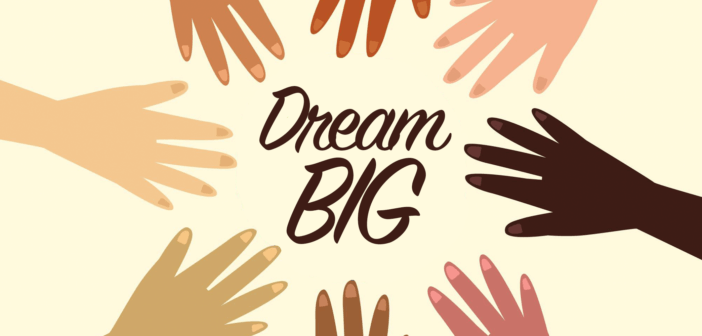Dr. Martin Luther King’s “I Have a Dream” speech proposed a big dream for what America can become. What big dreams do you have for your congregation and community? Lewis Center Director Doug Powe shares four key characteristics of big dreams that propel us toward a future shaped by participating in God’s transforming work.
Many of us have heard Dr. Martin Luther King’s “I Have a Dream” speech. It is a speech that proposes a big dream for what America can become. One line talks about his dream that in Alabama “little black boys and black girls will be able to join hands with little white boys and white girls.” We hear this line today and some of us think it is not a dream, it is reality. But at the time King uttered these words, it was a big dream.
King’s legacy teaches some important leadership lessons about dreaming big. In all our congregations, no matter our circumstance, we should have big dreams that propel us toward a future that is shaped by participating in God’s transforming work. What are some of the key characteristics of big dreams?
1. A big dream is not a solitary dream.
The dream outlined in Dr. Martin Luther King’s “I Have a Dream” speech reflected the hopes of many in the African American community. King was not sharing his personal hopes for the future, but the hopes of those within the Civil Rights Movement.
When we share a dream with our congregation, it should not be focused on what we as the leader wants to do. It should be a dream grounded in what we are hearing and experiencing so that we articulate a vision that points the community to a future they have already glimpsed but have not yet fully imagined. The leader is called to articulate the “already but not yet” in a clear picture using contextually resonate language. Helping your community dream big means articulating what is in their hearts and minds, not just the leader’s ideas.
2. A big dream requires everyone.
King draws the listeners into his speech early on by saying “we stand here today” and “we’ve come to our nation.” He continually uses “we.” The work that must be done is not dependent upon one person or a leadership team. The work that must be done requires everyone. When sharing a big dream, we must articulate that there is space for everyone in making the dream a reality. The dream is not about only a small group, it is about what we can accomplish together. David McAllister-Wilson, president of Wesley Theological Seminary, always says, “people support what they help build.” Inviting everyone to participate in a big dream grounded in what you have heard and experienced increases the likelihood of success.
3. A big dream requires honesty about the amount of work required.
King is clear that the path toward the big dream that he articulates is not easy. It is inherent in the nature of a dream that it is something we can picture but cannot quite touch it yet.
Let me use an example from sports. A football team that made the playoffs last year and returns all its players may be on a mission to go to the Super Bowl, but it is not a dream. It is not a dream because the team already is set up to accomplish the goal. This does not mean that it will happen but that they are resourced to do so. But going to the Super Bowl is a dream for a team that finished in last place the previous year and has had a long losing record. They are not resourced to go to the Super Bowl, nor is it likely given their history. While the team may have a picture of what the Super Bowl is, it cannot easily imagine making it to the big game. It is going to take a lot of work and change for the last place team to make it to a Super Bowl. A coach would need to be honest about it and not make it sound like a quick fix. We must be honest in our congregations when we articulate a big dream. If it is truly a big dream, it will require a lot of work.
4. Big dreams make a difference.
One of the most important aspects of King’s speech is that he shares the difference achieving the big dream will make. Achieving his dream will make America the great country it seeks to be. He helps those listening understand what is at stake in working to realize the big dream.
We must do the same thing in our congregations. What difference will your big dream make? Will it change your community for the better? Will it make a difference for the elementary school across the street? We must convince others that the dream we are articulating has significance beyond the congregation. Knowing what the transformation could look like helps others to buy into the big dream.
As we celebrate King, let’s remember to dream big. Let’s do so by developing a dream grounded in the hopes of the community that invites the participation of all and that transparently acknowledged that it will not be easy but will contribute significantly to God’s transforming work.
Related Resources
- What Would Martin Luther King Jr. Say to the Church Today? by Tony Hunt
- Dream Big to Reach New People, a Leading Ideas Talks podcast episode featuring Olu Brown
- New Possibilities Are All Around You by Joe Daniels and Christie Latona
Hands image by Freepik







